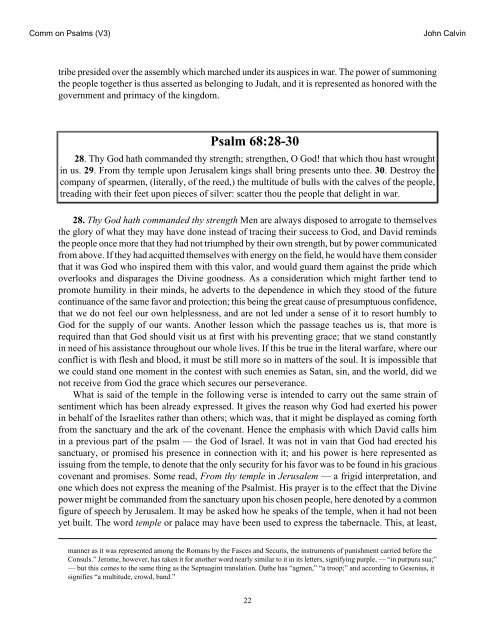Commentary on Psalms - Volume 3 - Bible Study Guides
Commentary on Psalms - Volume 3 - Bible Study Guides
Commentary on Psalms - Volume 3 - Bible Study Guides
- No tags were found...
Create successful ePaper yourself
Turn your PDF publications into a flip-book with our unique Google optimized e-Paper software.
Comm <strong>on</strong> <strong>Psalms</strong> (V3)John Calvintribe presided over the assembly which marched under its auspices in war. The power of summ<strong>on</strong>ingthe people together is thus asserted as bel<strong>on</strong>ging to Judah, and it is represented as h<strong>on</strong>ored with thegovernment and primacy of the kingdom.Psalm 68:28-3028. Thy God hath commanded thy strength; strengthen, O God! that which thou hast wroughtin us. 29. From thy temple up<strong>on</strong> Jerusalem kings shall bring presents unto thee. 30. Destroy thecompany of spearmen, (literally, of the reed,) the multitude of bulls with the calves of the people,treading with their feet up<strong>on</strong> pieces of silver: scatter thou the people that delight in war.28. Thy God hath commanded thy strength Men are always disposed to arrogate to themselvesthe glory of what they may have d<strong>on</strong>e instead of tracing their success to God, and David remindsthe people <strong>on</strong>ce more that they had not triumphed by their own strength, but by power communicatedfrom above. If they had acquitted themselves with energy <strong>on</strong> the field, he would have them c<strong>on</strong>siderthat it was God who inspired them with this valor, and would guard them against the pride whichoverlooks and disparages the Divine goodness. As a c<strong>on</strong>siderati<strong>on</strong> which might farther tend topromote humility in their minds, he adverts to the dependence in which they stood of the futurec<strong>on</strong>tinuance of the same favor and protecti<strong>on</strong>; this being the great cause of presumptuous c<strong>on</strong>fidence,that we do not feel our own helplessness, and are not led under a sense of it to resort humbly toGod for the supply of our wants. Another less<strong>on</strong> which the passage teaches us is, that more isrequired than that God should visit us at first with his preventing grace; that we stand c<strong>on</strong>stantlyin need of his assistance throughout our whole lives. If this be true in the literal warfare, where ourc<strong>on</strong>flict is with flesh and blood, it must be still more so in matters of the soul. It is impossible thatwe could stand <strong>on</strong>e moment in the c<strong>on</strong>test with such enemies as Satan, sin, and the world, did wenot receive from God the grace which secures our perseverance.What is said of the temple in the following verse is intended to carry out the same strain ofsentiment which has been already expressed. It gives the reas<strong>on</strong> why God had exerted his powerin behalf of the Israelites rather than others; which was, that it might be displayed as coming forthfrom the sanctuary and the ark of the covenant. Hence the emphasis with which David calls himin a previous part of the psalm — the God of Israel. It was not in vain that God had erected hissanctuary, or promised his presence in c<strong>on</strong>necti<strong>on</strong> with it; and his power is here represented asissuing from the temple, to denote that the <strong>on</strong>ly security for his favor was to be found in his graciouscovenant and promises. Some read, From thy temple in Jerusalem — a frigid interpretati<strong>on</strong>, and<strong>on</strong>e which does not express the meaning of the Psalmist. His prayer is to the effect that the Divinepower might be commanded from the sanctuary up<strong>on</strong> his chosen people, here denoted by a comm<strong>on</strong>figure of speech by Jerusalem. It may be asked how he speaks of the temple, when it had not beenyet built. The word temple or palace may have been used to express the tabernacle. This, at least,manner as it was represented am<strong>on</strong>g the Romans by the Fasces and Securis, the instruments of punishment carried before theC<strong>on</strong>suls.” Jerome, however, has taken it for another word nearly similar to it in its letters, signifying purple, — “in purpura sua;”— but this comes to the same thing as the Septuagint translati<strong>on</strong>. Dathe has “agmen,” “a troop;” and according to Gesenius, itsignifies “a multitude, crowd, band.”22
















